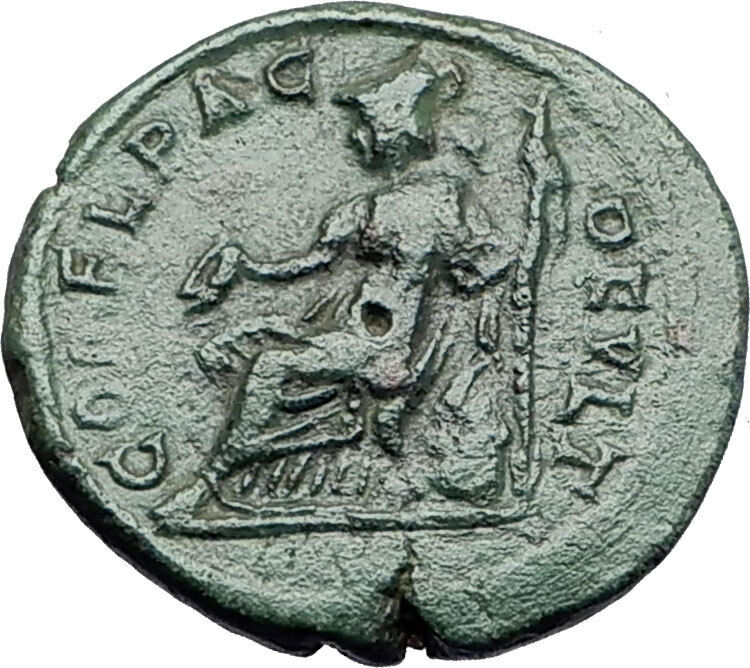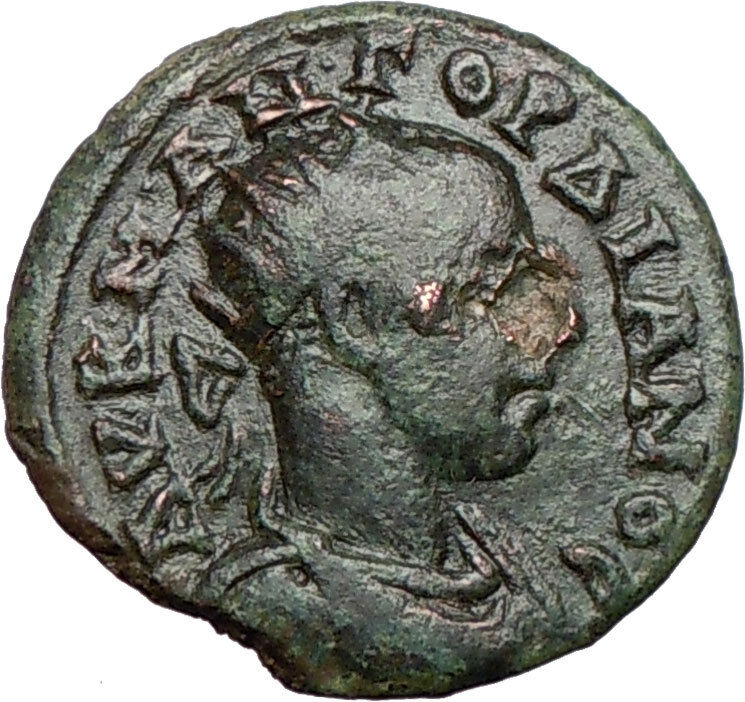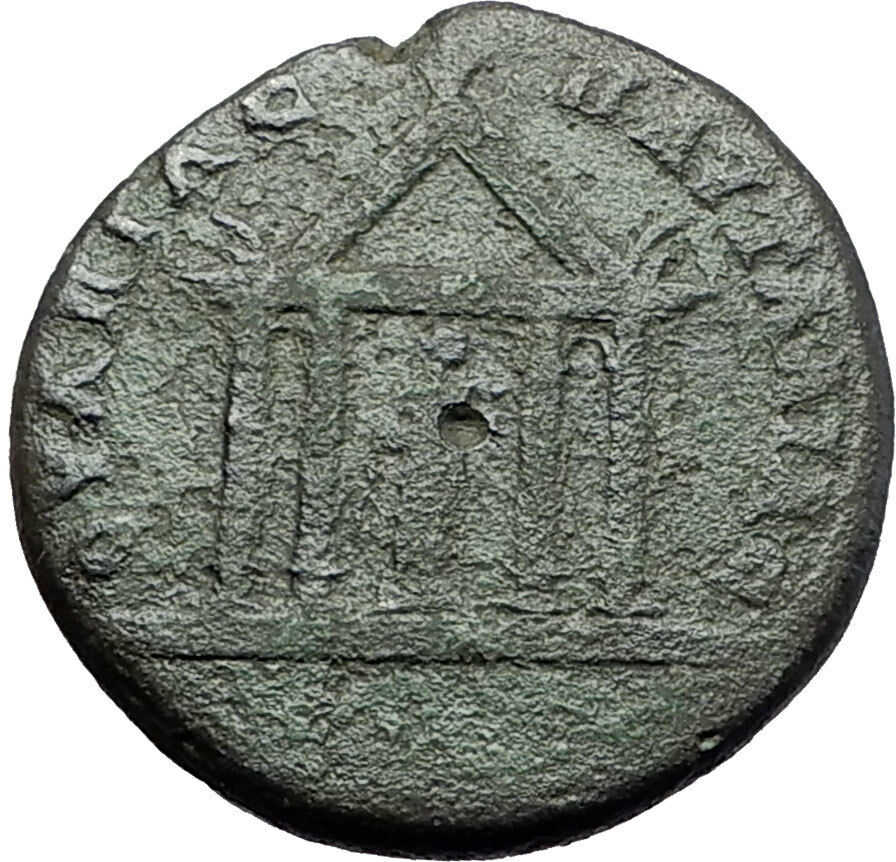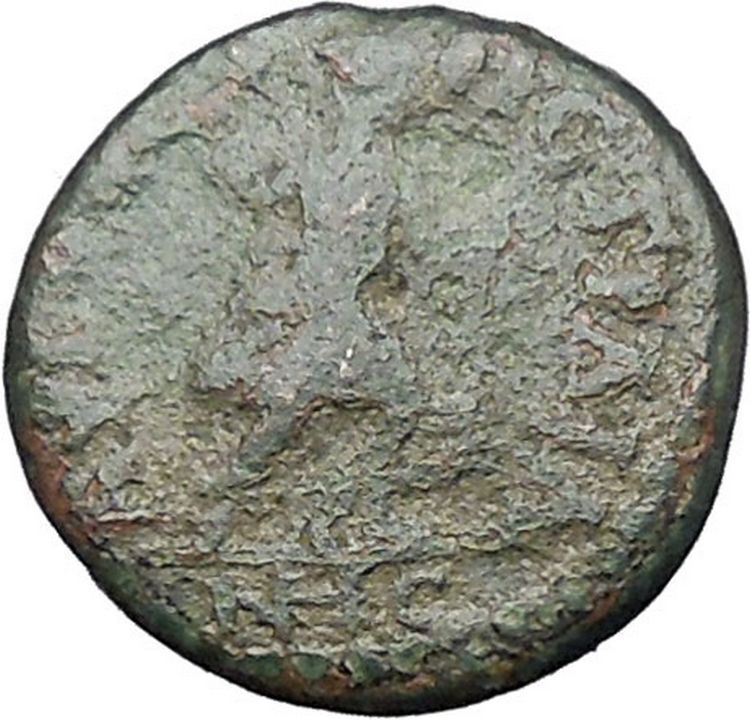|
Severus Alexander – Roman Emperor: 222-235 A.D.
Severus Alexander and Julia Mamaea
Bronze 25mm (11.42 grams) of Marcianopolis in Moesia Inferior under Magistrate Umbrius Tereventinus
Reference: Varbanov 1846 var.
Laureate and cuirassed bust of Severus Alexander, facing diademed and draped bust of Julia Mamaea.
HΓ OVM TEPEBENTINOV MAPKIANOΠOΛITΩN, Nemesis standing left, holding scales and scepter; wheel to left; E in right field.
You are bidding on the exact item pictured, provided with a Certificate of Authenticity and Lifetime Guarantee of Authenticity.
In Greek mythology, Nemesis (Greek, Νέμεσις), also called Rhamnousia/Rhamnusia (“the goddess of Rhamnous“) at her sanctuary at Rhamnous, north of Marathon, was the spirit of divine retribution against those who succumb to hubris (arrogance before the gods). The Greeks personified vengeful fate as a remorseless goddess. The name Nemesis is related to the Greek word νέμειν [némein], meaning “to give what is due”. The Romans equated the Greek Nemesis with Invidia. (Aronoff 2003).
“Nemesis” is now often used as a term to describe one’s worst enemy, normally someone or something that is the exact opposite of oneself but is also somehow similar. For example, Professor Moriarty is frequently described as the nemesis of Sherlock Holmes.
Marcianopolis, or Marcianople was an ancient Roman city in Thracia. It was located at the site of modern day Devnya, Bulgaria.
The city was so renamed by Emperor Trajan after his sister Ulpia Marciana, and was previously known as Parthenopolis. Romans repulsed a Gothic attack to this town in 267 (or 268), during the reign of Gallienus. Diocletian made it the capital of the Moesia Secunda province.
Valens made it his winter quarters in 368 and succeeding years, Emperor Justinian I restored and fortified it. In 587, it was sacked by the king of the Avars but at once retaken by the Romans. The Roman army quartered there in 596 before crossing the Danube to assault the Avars.
Between 893 and 972 it was one of the most important medieval cities in south-eastern Europe.
 Julia Mamaea – Augusta: 222-235 A.D. Julia Mamaea – Augusta: 222-235 A.D.
| Mother of Severus Alexander | Daughter of Julia Maesa | Mother-in-law of Orbiana | Sister of Julia Soaemias | Nice of Julia Domna and Septimius Severus | Aunt of Elagabalus | Cousin of Caracalla and Geta |
Julia Avita Mamaea (14 or 29 August after 180–235) was the second daughter of Julia Maesa, a powerful Roman woman of Syrian Arab origin and Syrian noble Julius Avitus. She was a niece of empress Julia Domna and emperor Septimius Severus and sister of Julia Soaemias. She was born and raised in Emesa (modern Homs, Syria).
Julia’s first husband was a former consul (whose name is unknown) who died. Julia married as her second husband Syrian Promagistrate Marcus Julius Gessius Marcianus. Julia bore Marcianus two children, a daughter called Theoclia (little is known of her) and a son, Marcus Julius Gessius Bassianus Alexianus, later emperor Alexander Severus. Unlike her sister, Julia Mamaea was reported to be a virtuous woman, never involved in scandals.
As a member of the Imperial Roman family, she watched closely the death of her cousin Caracalla and the ascent to power of her nephew Elagabalus, the oldest grandson of Julia Maesa and her choice to the throne. Eventually Elagabalus and his mother Julia Soaemias proved incompetent rulers and favour fell on Alexander, Julia’s son. He became emperor in 222, following Elagabalus’ murder by the Praetorian Guard. Julia and her mother became regents in the name of Alexander, then 14 years old. Upon adulthood, Alexander confirmed his esteem for his mother and named her consors imperii (imperial consort). It was in this condition that she accompanied her son in his campaigns: a custom started with Julia Domna. Thus she travelled to the East, for the campaign against Parthia and to the Germania provinces. Julia Mamaea was with Alexander in Moguntiacum (modern Mainz), capital of Germania Superior, when he was assassinated by his troops. She suffered the same fate.
 Severus Alexander – Roman Emperor: 222-235 A.D. Severus Alexander – Roman Emperor: 222-235 A.D.
Caesar: 221-222 A.D. (under Elagabalus)
| Son of Julia Mamaea | Husband of Orbiana | Grandson of Julia Maesa | Nephew of Julia Soaemias | Cousin of Elagabalus | Second-cousin of Caracalla and Geta | Great-nephew of Septimius Severus and Julia Domna |
Marcus Aurelius Severus Alexander (October 1, 208–March 18, 235 AD), commonly called Alexander Severus, was the last Roman emperor (11 March 222–235) of the Severan dynasty. Alexander Severus succeeded his cousin, Elagabalus upon the latter’s assassination in 222 AD, and was ultimately assassinated himself, marking the epoch event for the Crisis of the Third Century—nearly fifty years of disorder, Roman civil wars, economic chaos, regional rebellions, and external threats that brought the Empire to near-collapse.
Alexander Severus was the heir apparent to his cousin, the eighteen-year-old Emperor who had been murdered along with his mother by his own guards—and as a mark of contempt, had their remains cast into the Tiber river. He and his cousin were both grandsons of the influential and powerful Julia Maesa, who had arranged for Elagabalus’ acclamation as Emperor by the famed Third Gallic Legion.
A rumor of Alexander’s death circulated, triggering the assassination of Elagabalus.
Alexander’s reign was marked by troubles. In military conflict against the rising Sassanid Empire, there are mixed accounts, though the Sassanid threat was checked. However, when campaigning against Germanic tribes of Germania, Alexander Severus apparently alienated his legions by trying diplomacy and bribery, and they assassinated him.
Life
Alexander was born with the name Marcus Julius Gessius Bassianus Alexianus. Alexander’s father, Marcus Julius Gessius Marcianus was a Syrian Promagistrate. His mother Julia Avita Mamaea was the second daughter of Julia Maesa and Syrian noble Julius Avitus and maternal aunt of Emperor Elagabalus. He had an elder sister called Theoclia and little is known about her. Alexander’s maternal great-aunt was empress Julia Domna (also Maesa’s younger sister) and his great-uncle in marriage was emperor Lucius Septimius Severus. Emperors Caracalla and Publius Septimius Geta, were his mother’s maternal cousins. In 221, Alexander’s grandmother, Maesa, persuaded the emperor to adopt his cousin as successor and make him Caesar and Bassianus changed his name to Alexander. In the following year, on March 11, Elagabalus was murdered, and Alexander was proclaimed emperor by the Praetorians and accepted by the Senate.
When Alexander became emperor, he was young, amiable, well-meaning, and entirely under the dominion of his mother. Julia Mamaea was a woman of many virtues, and she surrounded the young emperor with wise counsellors. She watched over the development of her son’s character and improved the tone of the administration. On the other hand, she was inordinately jealous. She also alienated the army by extreme parsimony, and neither she nor her son were strong enough to impose military discipline. Mutinies became frequent in all parts of the empire; to one of them the life of the jurist and praetorian praefect Ulpian was sacrificed; another compelled the retirement of Cassius Dio from his command.
On the whole, however, the reign of Alexander was prosperous until the rise, in the east, of the Sassanids. Of the war that followed there are various accounts. (Mommsen leans to that which is least favourable to the Romans). According to Alexander’s own dispatch to the senate, he gained great victories. At all events, though the Sassanids were checked for the time, the conduct of the Roman army showed an extraordinary lack of discipline. The emperor returned to Rome and celebrated a triumph in 233.
The following year he was called to face German invaders in Gaul, who had breached the Rhine frontier in several places, destroying forts and over-running the countryside. Alexander mustered his forces, bringing legions from the eastern provinces, and crossed the Rhine into Germany on a pontoon bridge. Initially he attempted to buy the German tribes off, so as to gain time. Whether this was a wise policy or not, it caused the Roman legionaries to look down on their emperor as one who was prepared to commit unsoldierly conduct. Herodian says “in their opinion Alexander showed no honourable intention to pursue the war and preferred a life of ease, when he should have marched out to punish the Germans for their previous insolence”. These circumstances drove the army to look for a new leader. They chose Gaius Iulius Verus Maximinus, a Thracian soldier who had worked his way up through the ranks.
Following the nomination of Maximinus as emperor, Alexander was slain (on either March 18 or March 19, 235), together with his mother, in a mutiny of the PrimigeniaLegio XXII . These assassinations secured the throne for Maximinus.
The death of Alexander is considered as the end of the Principate system established by Augustus. Although the Principate continued in theory until the reign of Diocletian, Alexander Severus’ death signalled the beginning of the chaotic period known as the Crisis of the Third Century which weakened the empire considerably.
Legacy
Alexander was the last of the Syrian emperors. Under the influence of his mother, he did much to improve the morals and condition of the people. His advisers were men like the famous jurist Ulpian, the historian Cassius Dio and a select board of sixteen senators; a municipal council of fourteen assisted the urban praefect in administering the affairs of the fourteen districts of Rome. The luxury and extravagance that had formerly been so prevalent at the court were put down; the standard of the coinage was raised; taxes were lightened; literature, art and science were encouraged; the lot of the soldiers was improved; and, for the convenience of the people, loan offices were instituted for lending money at a moderate rate of interest.
In religious matters Alexander preserved an open mind. It is said that he was desirous of erecting a temple to the founder of Christianity, but was dissuaded by the pagan priests.
Marriage
Alexander was married three times. His most famous wife was Sallustia Orbiana, Augusta, whom he married in 225. He divorced and exiled her in 227, after her father, Seius Sallustius, was executed for attempting to assassinate the emperor. Another wife was Sulpicia Memmia. Her father was a man of consular rank; her grandfather’s name was Catulus.
|





 Julia Mamaea – Augusta: 222-235 A.D.
Julia Mamaea – Augusta: 222-235 A.D. Severus Alexander – Roman Emperor: 222-235 A.D.
Severus Alexander – Roman Emperor: 222-235 A.D. 




